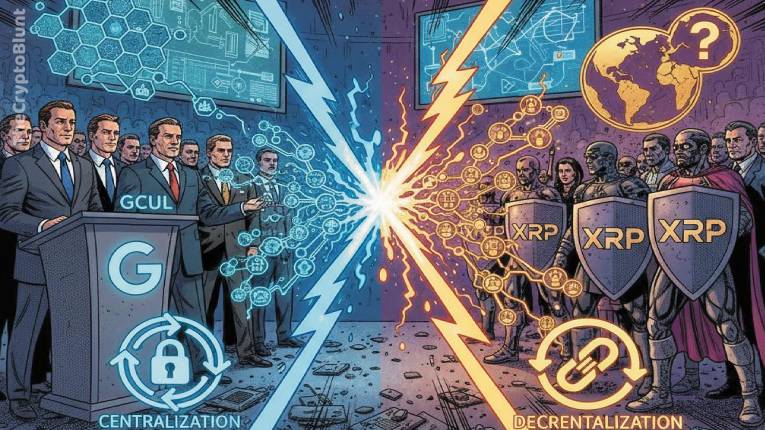While Google Cloud Universal Ledger has been dubbed an “XRP killer” by some, critics remain skeptical. It is being argued by them that its centralized control by Google runs counter to the core principles of decentralization.
Centralized vs. Decentralized: The Core Blockchain Debate
The recently launched Google Cloud Universal Ledger (GCUL), which is a private and permissioned blockchain, is being positioned as a secure platform for managing the full lifecycle of digital assets. GCUL was built on a “partnership model,” and it is designed to complement existing business frameworks rather than compete with them. Targeted at financial institutions, significant benefits are being promised by the platform for both service providers and their clients.
Although GCUL has been dubbed an “XRP killer” by some, parts of the industry have been left skeptical by its debut. Critics argue that no matter how large or well-resourced a platform may be, it cannot be considered truly decentralized if it is owned or controlled by a single entity.
Google’s technical expertise and financial strength, however, are seen as key advantages by others. It is being suggested by them that rather than having a blockchain built from scratch, it may be found more efficient by niche-focused projects to have them launched on GCUL. This view is echoed by Luigi D’Onorio DeMeo, Chief Strategy Officer at Ava Labs, who anticipates that their own Layer 1 chains will increasingly be opted to be deployed by well-funded, crypto-forward enterprises.
It is explained by DeMeo that as the market matures and demand increases, most companies will not be willing to have a chain built from scratch. Instead, a stack such as Avalanche will be opted for by them, which allows their own L1 to be launched in minutes.
That perspective is challenged by those who reject the notion that permissioned systems qualify as blockchains. It is argued by Yann Régis-Gianas, Head of Core Engineering at Nomadic Labs, that while Google may succeed in attracting partners to GCUL, its lack of decentralization means it functions more like a database than a blockchain.
This sentiment is shared by Shahaf Bar-Geffen, CEO of COTI. It is asserted by him that a blockchain cannot be considered public regardless of its efficiency.
It is argued by Bar-Geffen that while ‘GCUL is positioned as a Layer 1, its private and permissioned nature, which is managed solely by Google, diverges significantly from the ethos of public chains like Ethereum.’ A centrally controlled chain like GCUL might offer greater efficiency for specific institutional use cases, but the benefits of being fully decentralized and ‘trustless’ will not be inherited by it.
Is Google’s Blockchain Truly ‘Credibly Neutral’?
At its launch, GCUL was reportedly described as a “credibly neutral” platform by one Google executive—a claim that had debate sparked by it.
In written comments to News, Widmann’s neutrality claim was called “intriguing” by Bar-Geffen, but its feasibility was questioned. It was noted by him that in a system where Google controls node participation and potentially data flows, true neutrality is difficult to achieve. Even if impartiality is pursued by Google through audits and standards, Bar-Geffen warns that corporate interests could still have decisions influenced by them. Centralized control, he adds, could result in unilateral downtime or chain rollbacks.
One of GCUL’s key selling points is its potential to address the fragmentation that is plaguing digital finance. Yet, it is argued by critics that fragmentation may instead be deepened by it by creating a closed ecosystem that is limited to Google’s partners. This is seen by Régis-Gianas as an extension of Google’s longstanding strategy of building “walled gardens.”
It is contended by Régis-Gianas that “The real promise of blockchains is composability and interoperability, and every new walled garden has us pushed further from that goal.”
Agreement is given by Bar-Geffen, who suggests that a closed ecosystem around GCUL is a likely outcome given its permissioned structure and Google’s history in tech.
It is added by him that this fragmentation undermines Web3’s core objective of global interoperability, where assets and data flow seamlessly across chains without gatekeepers. Though, there are plans for connection to the broader Web3 ecosystem for liquidity.
















